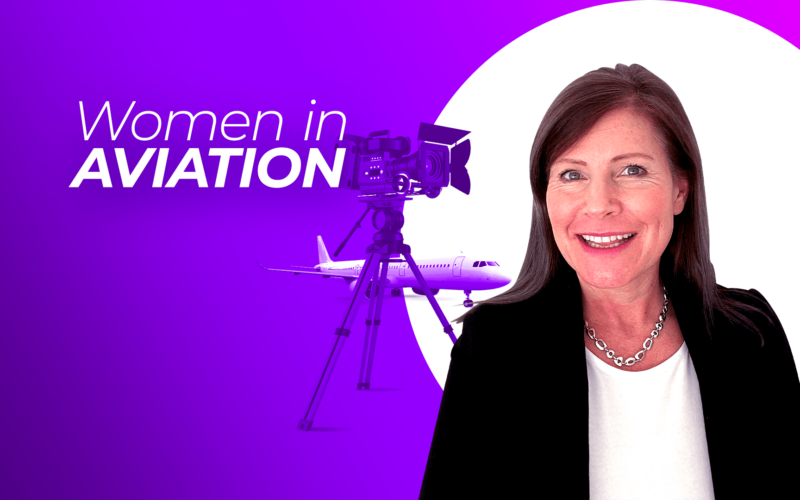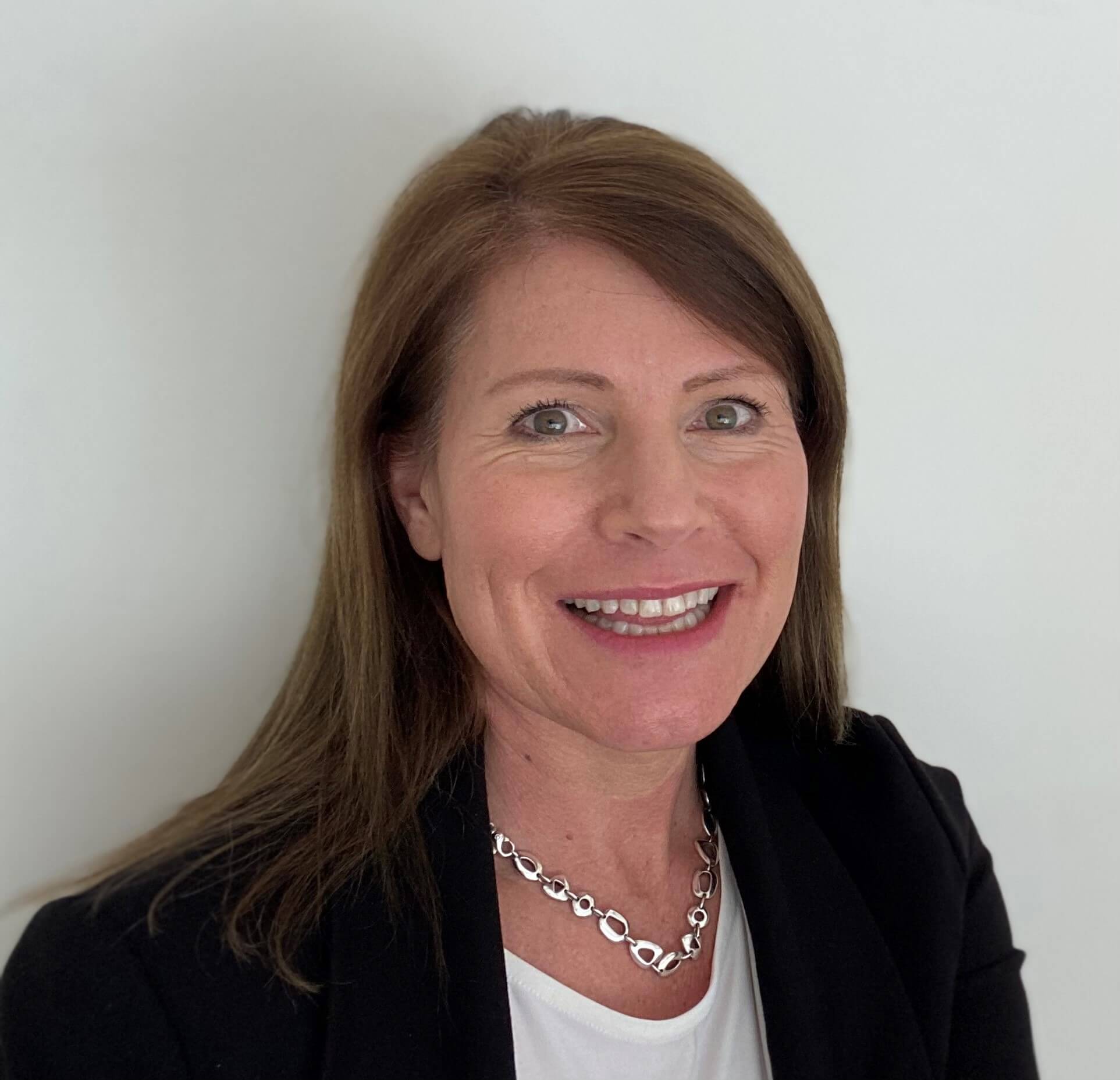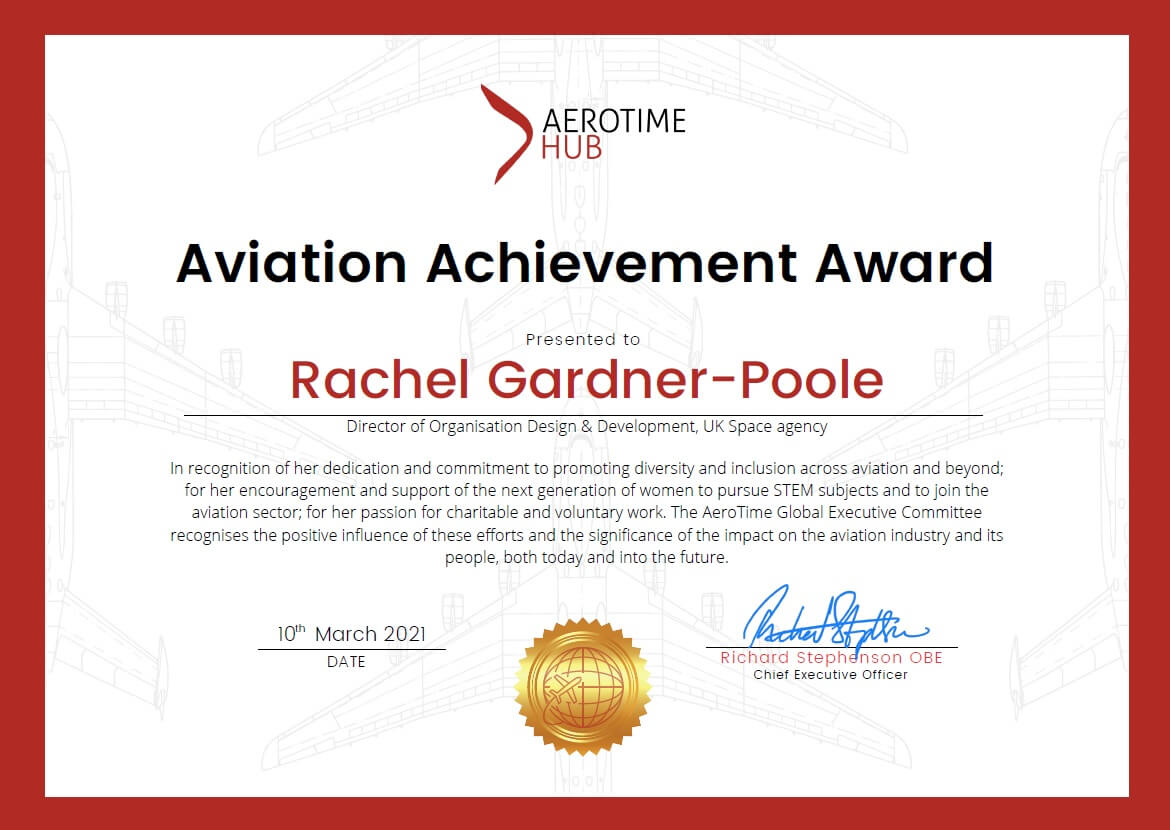Rachel Gardner-Poole did not expect to be told that women could not be pilots when she started her career “because they would faint”. Now, she is a pilot, as well as the Director of Organizational Design and Development at the UK Space Agency and a leading advocate for change and equality.
At the grand age of just five years old, Rachel’s love affair with aviation took-off after she heard about a charity that flew aid to developing countries. Proclaiming that she wanted to be a pilot when she grows up, Rachel imagined herself doing bush flying in places like Uganda or South Sudan. “But it did seem like an impossible dream and, obviously, flying is expensive. I’d never even been on the plane until I was an adult,” she recalls.
By the time she graduated with a degree in maths, Rachel applied for a job with an organization “which had a big picture of an aircraft, saying “mathematicians wanted” ‒ it looked ideal.” However, that route took her directly to a job with submarines rather than aircraft and it took her another five years to get her big break into aviation.
The “women can’t fly planes because they faint” attitude
When she finally joined aviation, Rachel wasn’t worried about the “boys’ club” and felt prepared for everything. Yet, she was “surprised” by the attitudes of some of her colleagues. Rachel is now a qualified pilot and has held ratings on a number of aircraft, but when she first had the opportunity to go for her private pilot license, not everyone was supportive, to say the least.
“I had a lot of people, a lot of colleagues telling me that women shouldn’t fly. And I was told that I might faint. I was told it’s not suitable for a female to consider flying planes, even privately”, she recalls, adding that she heard these comments being made in the workplace, within aviation.
The “women can’t fly planes because they faint” stereotype was accompanied by a more traditional, but even worse, “why choose a career if you can have babies?”. “I remember being told by people that maybe I shouldn’t consider promotion, because instead, I should focus on getting married and having children and therefore taking a career break.”
Rachel Gardner-Poole, he Director of Organizational Design and Development at the UK Space Agency
Despite the lack of enthusiasm and support she experienced early on, Rachel and many other women have still managed to be hugely successful in the industry. Unfortunately, she has also witnessed “quite a few” fellow women leave the industry because of how they were treated.
Contrary to the examples above, discrimination is not always as obvious but can be even more damaging. “Often it was kind of subtle things like being given a lot of the admin type jobs, even though they were scientists or mathematicians like myself, very qualified to do research and development type of tasks. But instead, they were being asked to do photocopying or doing really kind of laborious tasks, and not using their brain.”
Now, the industry is changing. While it is still a male-dominated field in which the percentage of women pilots or engineers is very small, these days you are less likely to hear someone saying directly that women shouldn’t fly because that wouldn’t be politically correct, Rachel observed. But this could be deceptive.
“The danger of this is that attitudes and behaviors about females in aviation can just be suppressed. So they could still be there but not as obvious, which then can be more difficult to challenge. When you look at pilots and engineers, they are still a vast majority of men and it’s one of those few careers where there hasn’t been that much percentage increase in terms of the number of females doing those roles.”
Mentoring & promoting STEM subjects
Having seen several of her friends and colleagues leave the industry because of inequality at the beginning of her career, Rachel has and continues to support other females in the field.
“The thing that I’m most proud of is actually when I’ve ended up mentoring. I’ve mentored a lot of females throughout my career. The feedback I get from them or when I actually see someone make it, you can see a positive difference and that, for me, is probably the most satisfying thing.”
Rachel says she likes helping others and the wanting to help comes from her own experience. “I’ve had a variety of leaders, I’ve had leaders who have really discouraged me from taking various roles because I was female. But then I’ve had fantastic leaders who have really encouraged me and if I’ve started to have self-doubt, or started to think maybe I shouldn’t, or couldn’t do something, they have really encouraged me to go for it. And that just makes such a difference. It’s something I’m really passionate about passing on to other people as well.”
Besides promoting equality in the workplace, Rachel is a sworn advocate for STEM subject promotion in schools. “Last week, I was speaking to 14 to 16-year-old girls about my career. that was only 20 minutes of my time, but I’m very conscious that 20 minutes could have had a massive impact on several of those young girls. So for me, that is time well spent.”
Despite what has already been achieved by paying more attention to STEM subjects, she believes there is always more that can be done to encourage young people to consider careers in aviation and to think about the wide scope of the industry reaching far beyond careers as a pilot or engineer.
“I’ve always said to my nieces and nephew, follow your dreams, you know, nothing’s impossible. And don’t ever give up.”
***
For her effort and dedication promoting diversity and inclusion, Rachel Gardner-Poole, the Director of Organizational Design and Development UK Space Agency, was presented with the AeroTime Aviation Achievement Award.
“Your encouragement and support of the next generation of women to pursue STEM subjects and to join the aviation sector and your passion for charity and voluntary work makes a significant impact on the aviation industry and its people both today and into the future,” AeroTime CEO Richard Stephenson said when presenting the award.



